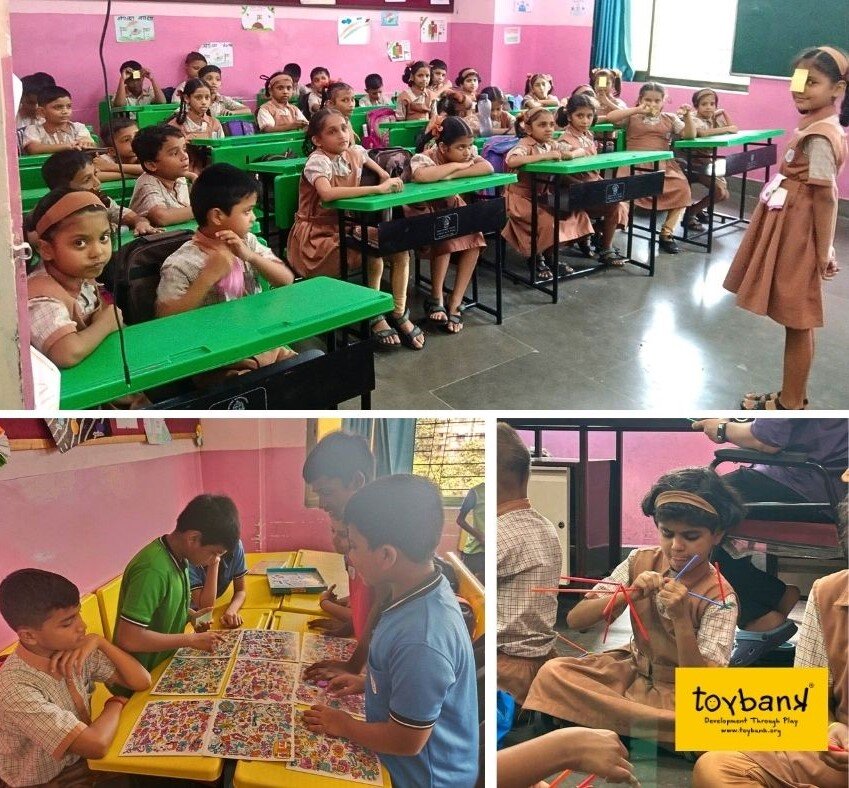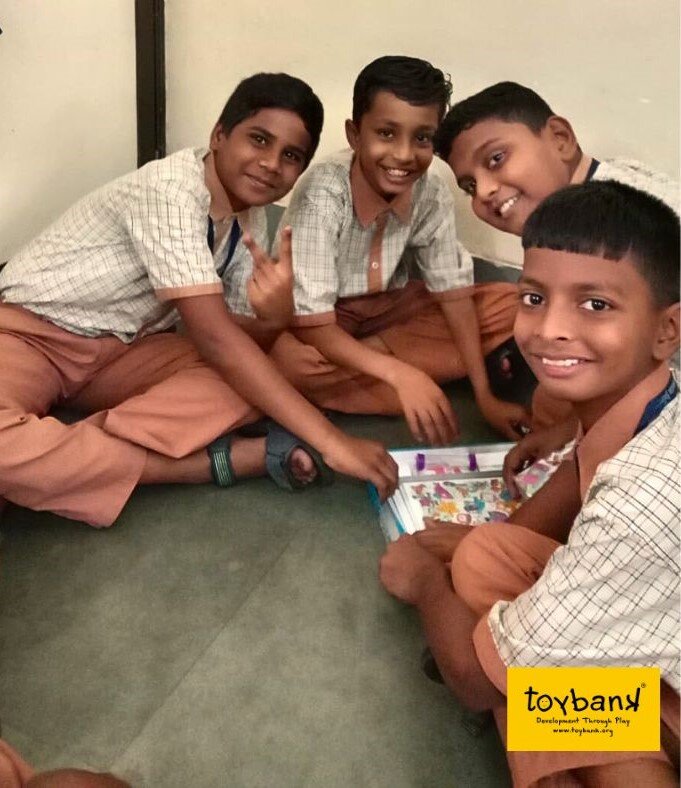By Pooja Saiya | Project Leader
Children experience poverty in multidimensional ways, beyond economic parametres. When they lack playfulness and joyfulness in childhood ecosystems, it disrupts developmental milestones and risks maladjusted adulthood. The marginalisation of children is made acute when they belong to at-risk families or communities. The decline of schools further aggravates this problem. According to the economic survey of Maharashtra for 2022-23, as many as 643 primary schools were shut down between 2019 and 2022.
While our Constitution assures children of their right to education, health and protection, another basic right — Right to Play — remains unrecognised, undervalued and unadopted.
India’s National Education Policy 2020 grants that no child loses any opportunity to learn and excel due to circumstances of birth or background. As part of the revised policy, there is an increased emphasis on play/activity-based learning at the foundational stage of education, something that is now missing in government schools.
Toybank - Development Through Play’s programmes look at play-based learning holistically. The programmes are structured in a way that focuses on developing skills of students and teachers. The children are provided access to carefully curated play material and play sessions, thus enabling a happier and safe space for them to learn.
We have been delivering our Play2Learn programme to 77,054 childrenthrough 623 Play Centres across seven districts of Maharashtra.
Here’s a quick update of the work brought together over the last few months:
1. Capacity Building Sessions for Programme Team
Ahead of a new school year, Toybank conducted a series of training sessions with the programme outreach team to refresh their knowledge of play and its importance in play-based learning. The objective was to help them understand the structure of play sessions, and the indicators of play (choice, wonder and delight), which in turn allows them to better understand how children are responding to the play sessions they conduct. The training also included activities, which informed them about the different forms of play, and its characteristics.
2. 4,572 Play2Learn sessions conducted in schools and community centres
Toybank’s Play centres are safe spaces for children to engage in developmentally appropriate play sessions. Play is the primary way in which children explore a world that is not in their control. At these Play2Learn sessions, children engage with games, toys and play-based activities, using innovative facilitation techniques by our Programme outreach team and Play Centre Facilitators (PCF). These games, and activities are chosen strategically to help children build various skills, including cognitive and interpersonal skills.
“The students genuinely enjoy Toybank’s Play sessions. The play sessions are also a source of relaxation for them, along with valuable learning experiences. I will ensure my students get to learn with Play at least twice a week, as I recognise the benefits it brings to my students,” said the principal at MPS CBSE Poonam Nagar School, Play Centre U423.
“Toybank’s play sessions allow children to understand difficult concepts. I have observed that students learn faster through play, are able to grasp information quickly and their brains are being stimulated to think logically. Play has also allowed teachers to help students understand difficult subjects. The attendance in our classes have also increased,” said the principal from ZPPS Kopra, Play Centre (R354).
3. Student testimonials:
“The India Map puzzle helped me understand the states of our country and where the cities are located. I also learned about the number of states my country has,” said Raghav (name changed), a student from MPS CBSE Poonam Nagar School, Play Centre (U424).
“When my classmates began to play the game, I was even more curious to learn it. In addition to using cards to get points in the game, I also learned the various English names for vegetables. I now have a greater understanding of the Point Salad game,” said Mohit (name changed),a student from MPS Aziz Baug (CBSE) Play centre U409.
4. Replacement of 4,126 Games across 160 Play Centres:
The programme team conducted stock and quality checks at the Play centres and initiated the process of restocking the games and play material at 160 centres. The team ensures that children have access to not just age-appropriate and category-wise games, but also that these games are in good condition. This also allows the PCFs and programme team to conduct play sessions smoothly.
5. ‘Power of Play’ Workshops:
Between July -September 2023, we conducted 50 ‘Power of Play’ Workshops for 431 PCFs from 193 Play centres to,
“Today, when we were playing the game Gotcha, I felt all our senses were being used, as we had to be attentive to the instructions being given. Our reflexes were in play so that we could not only save ourselves, but also try to catch the others. This play time allowed us to be in the moment and same is true for children. When they play, they are fully focused and they enjoy the moment,” shared a teacher from MPS CBSE Dadar Bhavani Shankar School Play Centre U411.
“Play creates an atmosphere where children learn and also have fun. Children should grow up to become non-judgemental and be humble. The activities and games we played today reminded me of my childhood days and how happy those days were,” shared a teacher from RH Kate English School, U354.
“As teachers we knew what play is but how play influences our brain and leads to developmental changes was a new learning for me. We have decided to add play in our timetable once a week so that our children can learn through play,” shared a teacher from Gandhi Bal Mandir School, U143.
6. Highlights:
On August 26, over 100 volunteers came together to distribute games to 1,674 children and conduct fun activities at seven schools in Malad. The day marked 19 years of Toybank – Development through Play, and was filled with learning, games, but most of all, play.
The day began with an induction of volunteers, where they were briefed about Toybank's work and the power of play. The volunteers were then split into groups and every group was assigned a class, where they spent the day playing, laughing and sharing stories with children. The volunteers also conducted fun activities and distributed educational games towards the end of the session.
In addition, one of our 16-year-old volunteers also organised an origami workshop for children of Grades 1 and 2. She taught them how to make butterflies, bookmarks and more. Pravin Tulpule, former naval officer turned clown, made the day even more special by going class-to-class and showing children magic tricks. The children were in awe of his tricks and amused by the jokes he told.
Story of Change: How Play had a positive effect on Class 6 student
Sagar (name changed) lives in the informal settlements at Powai Filter Pada and is a Class 6 student at a nearby school. His teacher mentioned that owing to his unpleasant surroundings, Sagar uses foul language in his communication and sometimes also bullies other children in class. He gets into physical fights and insults his peers.
During one of the play sessions, the programme outreach officer noticed that Sagar was not being attentive. He was then taught about being respectful in play sessions, which includes: Kind mouth, encouraging children to use words such as sorry and please; Caring hands, which encourages children to use their hands to help each other and not fight; and respect, which includes respecting your peers. Before every play session, children are reminded of these characteristics, to help them grow.
Following this, Sagar was encouraged to play games during the session and after three or four attempts, he agreed to play one of the games. The programme outreach officer noticed that he disliked playing by himself and then put him in a group. When he saw the teamwork between the other groups and how they all played together, he was motivated to do the same and began showing interest in play sessions.
With time, the programme outreach officer also noticed that Sagar was adhering to all the rules of a play session and was also being kind to his peers. The PCF mentioned that there have been positive changes in his behaviour and he always looks forward to attending more play sessions.
- Story shared the Programme Outreach Officer in-charge of Play Centre U400, MPS Tunga Village.
Thank you for supporting at-risk children’s learning through Play!
As a non-profit that envisions a world where every child is empowered through play, Toybank is creating safe spaces for at-risk children, providing them access to quality play material and mainstreaming its Conscious Play™ approach. Toybank’s play programme helps to develop cognitive abilities along with 21st-century life skills such as critical thinking and problem-solving.
With your continued support, Toybank bolsters its efforts to rebuild childhoods with equity, ensuring our children’s holistic development and mental well-being.
Project reports on GlobalGiving are posted directly to globalgiving.org by Project Leaders as they are completed, generally every 3-4 months. To protect the integrity of these documents, GlobalGiving does not alter them; therefore you may find some language or formatting issues.
If you donate to this project or have donated to this project, you can recieve an email when this project posts a report. You can also subscribe for reports without donating.
Support this important cause by creating a personalized fundraising page.
Start a Fundraiser





